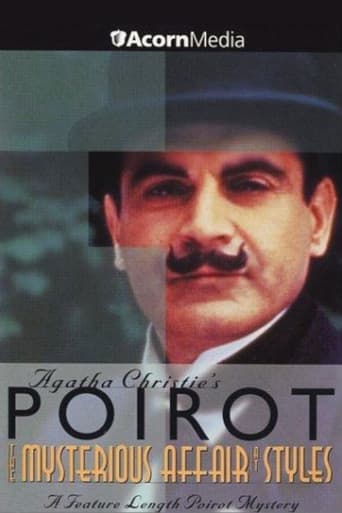grantss
World War 1 and British Army officer Arthur Hastings is recuperating in a quiet manor in the English countryside. When a woman is murdered in the household, Hastings enlists the help of an old friend to solve the mystery - Hercule Poirot.Intriguing and quite nostalgic. This is the mystery that cemented the Poirot-Hastings partnership. So quite an historic feel to it.
bensonmum2
While recovering from injuries received during the War, Lieutenant Hastings is invited to visit an old friend in his mother's, Mrs. Inglethorp, country estate. The household is in a state because of the mother's recent marriage to a strange man 20 years her junior. One night, Mrs. Inglethorp is taken ill and dies. The cause of death - poisoning. The family suspects the new husband, but he wasn't at home on the night of the murder. Looking for help in solving the mystery, Lieutenant Hastings calls on a war refugee from Belgium living in the village. He's an odd bird, but a great detective named Hercule Poirot.The Mysterious Affair at Styles isn't one of the great Christie works, but it's fun enough with interesting characters and a "nice" murder. I say it's not great because there are two things that really bug me (at least in this presentation of the story). First, the murderer makes the most illogical mistake imaginable. Why did he leave the incriminating piece of evidence where it could be found? Second, Poirot makes an awful lot of suppositions that just happen to be right. He's more clairvoyant here than usual.But none of that matters much when the rest of the episode is so good and fun. It's a real hoot watching Poirot march his fellow Belgian refugees through the streets of a small English village. They look like penguins on parade. It's also a treat to see Hastings and Poirot renew an old friendship. It's a really nice moment. And, it's also a joy to watch Japp and Poirot working together on their first English case. The only thing missing was Miss Lemon. I only wish they would have filmed The Mysterious Affair at Styles first. It would have nicely set-up everything to follow. For someone new to the series, I'd suggest going straight to S3E1 to start. Overall, a 7/10 from me.
sanddragon939
The Mysterious Affair at Styles, published in 1920, is a historic novel in 2 ways: It launched the literary career of the 'Queen of Crime'-Agatha Christie and it introduced to the world the greatest fictional detective after the legendary Sherlock Holmes, Hercule Poirot. Beyond its historical significance and the fact that it was obviously well-written with a well-constructed plot, the novel is not really considered remarkable when you stack it up against some of Christie's far superior and far more famous works published over the next several decades (The Murder of Roger Ackroyd, Murder on the Orient Express, Death on the Nile, A Murder is Announced, And Then There Were None stand out as some exceptional works), but nevertheless, it certainly deserved an adaptation of some sort which is precisely what Granada did for the centenary of Christie's birth year...STYLES tells the story of how the Belgian sleuth, Hercule Poirot(David Suchet), who is a refugee from his native land during the First World War, ends up being invited by his old English friend, Arthur Hastings (Hugh Fraser) to investigate the murder of a wealthy old woman, Mrs Inglethorp, who died under mysterious circumstances in her country house, Styles Court, in the middle of the night. Poirot puts his detective skills to good use, investigating the scene of the crime, interviewing suspects and witnesses, collecting evidence and ultimately using the little 'grey cells' of the brain to discover the hidden truths of the matter. There are certainly no shortage of suspects in this case: There is Mrs. Inglethorps eldest son to consider, not to mention his wife and younger brother; there is her protégée and of course her much younger second husband who is hated by the rest of the family. Clues are in abundance as well: a smashed coffee cup, a glass of cocoa, a burnt document, a piece of green thread... The differences between STYLES and other Poirot adaptations which Suchet acted in become apparent-there is the setting to consider; Poirot is no longer (or rather, hasn't yet reached) the Art Deco settings of 1930's London; his reputation is briefly hinted at but he still isn't considered the greatest and most famous detective of Europe; Hastings too is just getting used to the idea of playing the slow sidekick to a great mind. There are also certain differences derived from the fact that this is Christie's first novel, like the abundance of clues and tangible evidence, the vast number of red herrings (later Christie stories would have more subtle psychological elements), the excessive stereotyping of the characters etc. But all this shouldn't spoil your enjoyment of a well-directed and acted TV movie. A must watch for all Christie and Poirot fans!
dbdumonteil
Styles manor was certainly a place dear to the writer,for her first "Poirot" and her last one ("Curtain-Poirot's last case) in which the sleuth dies both take place there.That said "Styles" is not one of Poirot's best cases,and Christie wrote at least twenty books which are superior to it.Interest lies somewhere else.This is the novel which tells us why Belgian Poirot wound up in fair England -which he somewhat despised- and it does not forget the historical background ,with a fine depiction of the WW1 years.If my memory serves me well,Christie wrote the book cause she wanted to take up her sister's challenge: a story where you could never guess whodunit..





